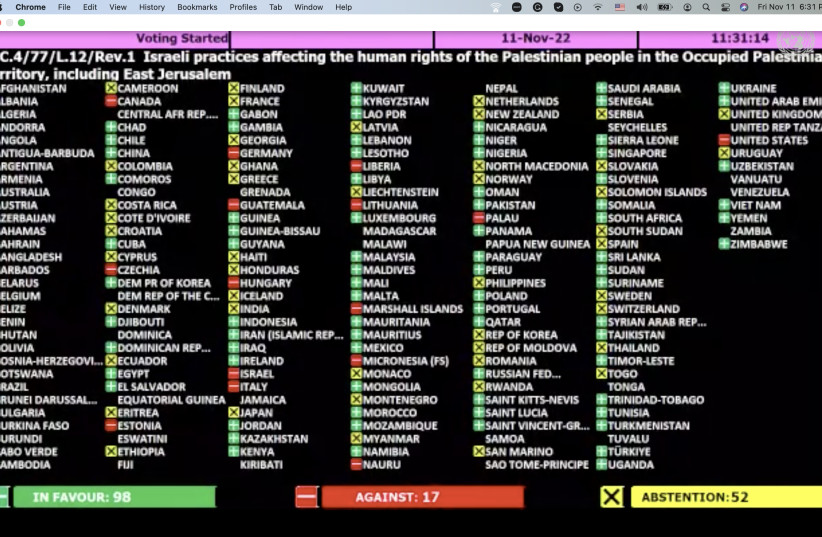An International Court of Justice advisory opinion on Israel’s control of and practices in the West Bank may have limited formal consequences, but international law experts told The Jerusalem Post on Sunday that the opinion sought by Friday’s vote in the UN General Assembly could have wide-ranging indirect ramifications.
Eighty-seven states voted in favor of the request for the ICJ to render an opinion on the legal consequences of “prolonged occupation, settlement and annexation of the Palestinian territory occupied” by Israel and its practices in these territories.
“The ICJ is the principal judicial body of the United Nations,” the Israel Democracy Institute’s and Hebrew University Prof. Yuval Shany explained, saying it renders opinions for the UN much like a legal adviser. It provides legal opinions on the functions of UN organs as well as “legal situations that the UN has to confront.”
While not binding, ICJ opinions hold weight
While ICJ advisory opinions are non-legally binding, experts noted that the documents can have a broad impact on organizations and other legal proceedings.
“The ICJ is requested from time to time to render these advisory opinions, and while they’re not formally legally binding they are influential in the way UN organizations adjust their policies, so it does impact on the way that the UN operates and it does influence the legal considerations in member states,” said Shany.

International Legal Forum CEO and human rights attorney Arsen Ostrovsky agreed that “such opinions of the ICJ are non-binding on the parties involved. They are purely of an advisory nature.” But he warned that “they do carry considerable moral weight and are regarded highly as a reference point by the legal community, as well as civil society and the United Nations.”
Dr. Daphné Richemond-Barak, a professor of international law at Reichman University, explained that the ICJ advisory opinion “doesn’t obligate a state as such” but the body could urge member states to take action. Member states could use the ruling as a basis to make political decisions. Whether the states’ local courts would use the advisory as legal precedent was not the main concern. The opinion was more relevant in international fora.
“It’s not so much what the opinion is going to say but how it’s going to be used in the future,” she said.
Richemond-Barak gave the example of the 2004 ICJ advisory opinion on the security barrier and how it became the keystone for many reports and resolutions by international bodies. The ICJ’s opinion of the legal consequences of Israel’s practices and control of the territories would likely be held in high regard due to the court’s prestige and air of authority.
Shany said Prime Minister Benjamin Netanyahu’s government would have to decide how to approach the ICJ opinion.
“There is always a question about what Israel should do – participate in the process or boycott,” said Shany. “If you don’t make your case you may politicize the process but may face a more hostile decision.” He said that in the case of the 2004 advisory opinion on the security barrier, Israel made a compromise between the two.
In response to the ICJ’s 2004 evaluation on the “Legal Consequences of the Construction of a Wall in the Occupied Palestinian Territory,” the government submitted a statement challenging the “jurisdiction of the court and the propriety of any response by it on the substance of the request,” but refused to address the legality of the fence.
According to Shany, the opinion could take between one to two years to formulate, and in that time, even if the new government doesn’t directly respond to the proceedings, statements made by ministers could influence the decisions. This legal specter could therefore impact the speech of Israeli ministers.
“Although the new process began prior to the new government, the statements made by the ministers will impact the deliberations,” said Shany. Talk of “exclusive rights of Jews over all the territory of Israel, while this may play very well to the home base, in The Hague proceedings could be damaging.”
